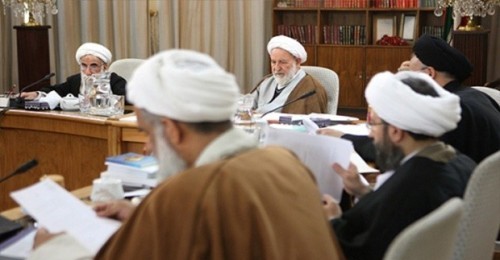PHOTO: Iran’s Guardian Council in session
Amid the unexpected success of centrists and reformists in Iran’s elections, the Guardian Council — mandated by the Supreme Leader and judiciary to vet candidates — is showing cracks.
The Council disqualified thousands of candidates, including almost all reformists, before last Friday’s ballots for Parliament and the Assembly of Experts.
However, the remaining 90 reformists for the Majlis joined centrists, linked to President Rouhani and former President Hashemi Rafsanjani, to form a “List of Hope”. The alliance took all 30 Parliamentary seats in Tehran and now holds a large minority in the next Majlis.
Clerics close to the centrist-reformist bloc also claimed an unexpected triumph in Tehran, winning 15 of 16 positions. Among conservatives who lost their positions were the current Assembly chair, Ayatollah Mohammad Yazdi. The head of the Guardian Council, Ayatollah Ahmad Jannati, barely held his seat by finishing in 16th.
On Tuesday, Guardian Council spokesman Nejatollah Ebrahimian criticized the mass purge of candidates as neither “efficient nor effective”.
In an interview with the newspaper Etemad. Ebrahimian said information from “intelligence agencies” was “contradictory” and complained about the burdens of the process:
In twenty days you cannot review six thousand complaints of disqualified candidates based upon contradictory reports. The constitution requires that you give each individual an opportunity to present a statement and offer a defense… The review of candidates requires at least a year.
Ebrahimian went farther by citing “serious differences” with Jannati.
The spokesman attempted to resign in mid-January, after the first round of disqualifications from the Parliamentary contest, but Jannati reportedly did not accept his letter Reports, denied by Ebrahimian, suggested that several other Council members had also submitted their resignations because of differences with Jannati.
The hardline Raja News hit back on Wednesday with an editorial denouncing the “reformist newspapers” Shargh and Etemad for publishing Ebrahimian’s remarks. Raja said the airing of the Guardian Council’s “internal disagreements” was an attempt to cast doubt on the Council’s role in the Islamic Republic’s system.
The 12 members of the Guardian Council are appointed by the Supreme Leader and the judiciary. Since the early 1990s, soon after the appointment of Ayatollah Khamenei as Leader, they have policed the electoral process, banning all candidates deemed as unacceptable.
Combined with other measures such as detentions and limits on communications, the bans have suppressed reformists for more than a decade and helped ensure conservative dominance.
However, in 2013, the Council’s disqualification of former President Rafsanjani from the Presidential race when his protégé Hassan Rouhani — allowed to stand as a consolation candidate — won a surprise victory.

